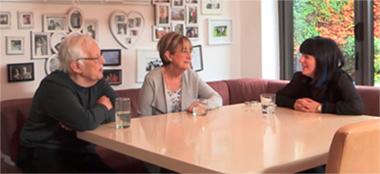Coming in March: First MOOC on Lesser-Known Dementia Variants
Quick Links
"I can read small print but not large fonts. I have to explain over and over again that the problem is not with my eyes but with how my brain interprets the signal. Half the time people doubt me because PCA is not well known." Stories like this kept cropping up in a support group hosted by University College London for people living with posterior cortical atrophy, aka PCA or visual/posterior variant of Alzheimer’s disease. The stories inspired UCL’s Timothy Shakespeare to raise awareness about under-recognized forms of dementia, and when UCL invited proposals from its researchers to help the institution enter the rapidly growing world of massive open online courses (MOOCs), an opportunity arose. Ten months later, the first such course is about to start on March 14.
“The patients and carers in the support groups are very keen on greater awareness,” said Shakespeare, who as a postdoc in Nick Fox’s group at UCL uses diffusion-tensor imaging to study white-matter changes in PCA. Creating this course was a side project for him and for Sebastian Crutch at UCL’s Dementia Research Centre.

A husband, wife, and daughter talk about living with dementia with Lewy bodies in Week 3 of an upcoming online course hosted by FutureLearn. [Courtesy of UCL.]
The UCL Dementia Research Centre involves its junior and senior clinicians in the support groups it offers for five dementia variants, i.e., familial Alzheimer’s disease, PCA, primary progressive aphasia, frontotemporal dementia, and familial frontotemporal dementia. This work helps all involved gather and share expertise, and reach beyond the isolation of living with a rare, progressive disease. The MOOC is an opportunity to bring knowledge about these poorly understood conditions to a global audience. It takes place amid a growing trend of universities sharing more of their expertise publicly, both as part of a civic effort to engage the public and to bolster their reputations and attract students, faculty, and donors.
Called “The Many Faces of Dementia,” the course will run on FutureLearn, founded in 2012 as the United Kingdom's the first massive online learning platform. FutureLearn offers courses on hundreds of topics and is owned by The Open University, a public distance-learning and research university based in Milton Keynes, England. The content of the rare dementia course is owned by UCL.
The course comprises two hours of programming per week for one month. Each week is dedicated to a particular disease, starting with familial AD and continuing through FTD, DLB, and ending with PCA. The material consists mainly of three- to five-minute documentaries featuring interviews with people living with each disease, leading clinician-researchers at UCL, or current research projects. For example, the familial AD segment will talk about the Dominantly Inherited Alzheimer Network (DIAN) treatment trial being conducted at UCL. In addition, each course segment contains articles for reading, as well as short quizzes that give explanatory feedback in response to wrong answers.
A special asset of this MOOC is its social-learning component, Shakespeare told Alzforum. Discussion is an important part of the learning process, and the course has been built accordingly. Every section has a comment space where people can share their own experiences while they are taking the course. “When we create the content, the idea is to make it so that it will prompt people to further teach each other on some aspects of what they are learning about,” Shakespeare said. This social component works best when learners take the course in real time, i.e., keep up with the weekly pace. Even so, each learner can take the course at their leisure, enabling people around the world to fit it around their schedules.
Different audiences may take away different things. Professionals who work with middle-aged to older people—nurses, doctors, and speech, language, and occupational therapists—can learn to recognize the symptoms of these diseases. For example, an informed optometrist or ophthalmologist might refer the patient who can read the fine print but not the title to a neurologist right away, rather than spending a year experimenting with different prescription glasses. Basic researchers who toil at the bench without ever meeting patients may redouble their sense of purpose by seeing what these diseases do to people and their families. Primary care, geriatric, and psychiatric providers may learn to recognize these rare diseases faster next time a patient walks through their door. Social workers and clergy could better understand the reasons for dysfunction and despair. “We hope the course will be worth the time for anyone who has an interest in dementia,” Shakespeare said.
How “massive” is this short MOOC? Time will tell. Three weeks before start, more than 8,000 people, largely in the United Kingdom, have registered, and 1,200 of them have introduced themselves on the course’s discussion forum.—Gabrielle Strobel
References
External Citations
Further Reading
News
- Tau Tracers Track First Emergence of Tangles in Familial Alzheimer’s
- 100 DIAN Family Members Gather for Their First International Meeting
- Researchers Join to Draw Posterior Cortical Atrophy Out of Shadows
- Does Brain Development in Childhood Set the Stage for Dementia?
- Dementia with Lewy Bodies: Is the Research Ready For Clinical Trials
- Spectrum of Neurodegeneration Comes to the Fore
- Vancouver Frontotemporal Dementia Conference Shows Awakening Field
- Scientists Strategize With Regulators for Frontal Assault on FTD
Annotate
To make an annotation you must Login or Register.

Comments
No Available Comments
Make a Comment
To make a comment you must login or register.